
Much of the history of Algeria has taken place on the fertile coastal plain of North Africa, which is often called the Maghreb. North Africa served as a transit region for people moving towards Europe or the Middle East, thus, the region's inhabitants have been influenced by populations from other areas, including the Carthaginians, Romans, and Vandals. The region was conquered by the Muslims in the early 8th century AD, but broke off from the Umayyad Caliphate after the Berber Revolt of 740. During the Ottoman period, Algeria became an important state in the Mediterranean sea which led to many naval conflicts. The last significant events in the country's recent history have been the Algerian War and Algerian Civil War.
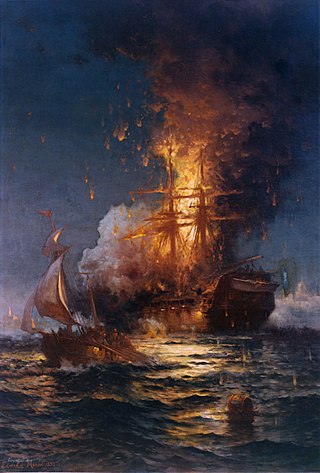
The Barbary Wars were a series of two wars fought by the United States, Sweden, and the Kingdom of Sicily against the Barbary states and Morocco of North Africa in the early 19th century. Sweden had been at war with the Tripolitans since 1800 and was joined by the newly independent US. The First Barbary War extended from 10 May 1801 to 10 June 1805, with the Second Barbary War lasting only three days, ending on 19 June 1815. The Barbary Wars were the first major American war fought entirely outside the New World, and in the Arab World.

The Barbary pirates, Barbary corsairs, or Ottoman corsairs were mainly Muslim pirates and privateers who operated from the largely independent Ottoman Barbary states. This area was known in Europe as the Barbary Coast, in reference to the Berbers. Slaves in Barbary could be of many ethnicities, and of many different religions, such as Christian, Jewish, or Muslim. Their predation extended throughout the Mediterranean, south along West Africa's Atlantic seaboard and into the North Atlantic as far north as Iceland, but they primarily operated in the western Mediterranean. In addition to seizing merchant ships, they engaged in razzias, raids on European coastal towns and villages, mainly in Italy, France, Spain, and Portugal, but also in the British Isles, the Netherlands, and Iceland.

The sack of Baltimore took place on 20 June 1631, when the village of Baltimore in West Cork, Ireland, was attacked by pirates from the Barbary Coast of North Africa – the raiders included Dutchmen, Algerians, and Ottoman Turks. The attack was the largest by Barbary slave traders on Ireland.
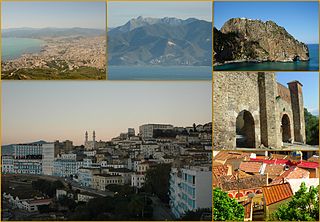
Béjaïa formerly Bougie and Bugia, is a Mediterranean port city and commune on the Gulf of Béjaïa in Algeria; it is the capital of Béjaïa Province, Kabylia. Béjaïa is the largest principally Kabyle-speaking city in the region of Kabylia, Algeria.

The Regency of Algiers was a largely independent early modern Ottoman tributary state on the Barbary Coast of North Africa between 1516 and 1830 established by the corsair brothers Aruj and Hayreddin Barbarossa, also known as Oruç and Khayr ad-Din. The Regency was an infamous and formidable pirate base that plundered and waged maritime holy war on European Christian powers. Ottoman regents ruled it as heads of a military oligarchy of janissaries and corsairs.
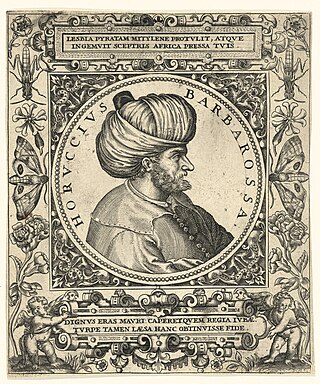
Aruj Barbarossa, known as Oruç Reis to the Turks, was an Ottoman corsair who became Sultan of Algiers. The elder brother of the famous Ottoman admiral Hayreddin Barbarossa, he was born on the Ottoman island of Midilli and died in battle against the Spanish at Tlemcen.
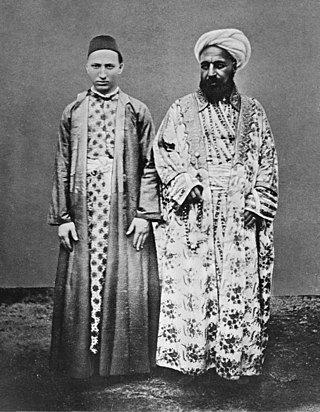
White slavery refers to the enslavement of any of the world's European ethnic groups throughout human history, whether perpetrated by non-Europeans or by other Europeans. Slavery in ancient Rome was frequently dependent on a person's socio-economic status and national affiliation, and thus included European slaves. It was also common for European people to be enslaved and traded in the Muslim world; European women, in particular, were highly sought-after to be concubines in the harems of many Muslim rulers. Examples of such slavery conducted in Islamic empires include the Arab slave trade, the Barbary slave trade, and the Black Sea slave trade, among others. It was common for Europeans to be traded alongside Africans, Turks, Iranians, and sometimes other Arabs.

Ottoman Tripolitania, also known as the Regency of Tripoli, was officially ruled by the Ottoman Empire from 1551 to 1912. It corresponded roughly to the northern parts of modern-day Libya in historic Tripolitania and Cyrenaica. It was initially established as an Ottoman province ruled by a pasha (governor) in Tripoli who was appointed from Constantinople, though in practice it was semi-autonomous due to the power of the local Janissaries. From 1711 to 1835, the Karamanli dynasty ruled the province as a de facto hereditary monarchy while remaining under nominal Ottoman suzerainty. In 1835, the Ottomans reestablished direct control over the region until its annexation by Italy in 1912.

Hussein Dey was the last Dey of the Deylik of Algiers.
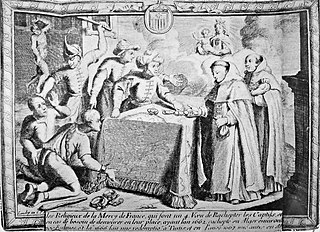
The Barbary slave trade involved the capture and selling of European slaves at slave markets in the largely independent Ottoman Barbary states. European slaves were captured by Barbary pirates in slave raids on ships and by raids on coastal towns from Italy to the Netherlands, Ireland and the southwest of Britain, as far north as Iceland and into the Eastern Mediterranean.

Relations between France and Algeria span more than five centuries. This large amount of time has led to many changes within the nation of Algeria; subsequently, affecting the relations enormously. Through this time period, Algeria has gone through being part of the Ottoman Empire, being conquered and colonized by France, playing an important role in both world wars, and finally being its own nation. Over time, relations between the nations have suffered, as tension between Algerians and the French have increased.

Diplomatic relations between Algeria and Greece date back for more than 2000 years. Diplomatic relations have been solid since Algeria's first years of independence. Greece maintains an embassy in Algiers, and Algeria is represented in Greece by its embassy in Athens. Trade between Greece and Algeria is increasing, with imports of natural gas from Algeria an important factor. There have been problems with illegal immigration from Algeria to Greece in recent years, and with Algerian trafficking of Sub-Saharan Africans seeking to enter the European Union.
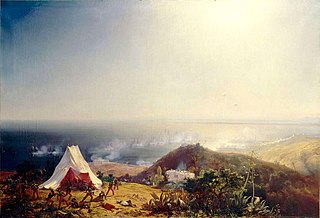
The invasion of Algiers in 1830 was a large-scale military operation by which the Kingdom of France, ruled by Charles X, invaded and conquered the Deylik of Algiers.

The French conquest of Algeria took place between 1830 and 1903. In 1827, an argument between Hussein Dey, the ruler of the Regency of Algiers, and the French consul escalated into a blockade, following which the July Monarchy of France invaded and quickly seized Algiers in 1830, and seized other coastal communities. Amid internal political strife in France, decisions were repeatedly taken to retain control of the territory, and additional military forces were brought in over the following years to quell resistance in the interior of the country.

The invasion of Algiers was a massive and disastrous amphibious attempt in July 1775 by a combined Spanish and Tuscan force to capture the city of Algiers, the capital of The Deylik of Algeria. The amphibious assault was led by Spanish general Alexander O'Reilly and Tuscan admiral Sir John Acton, commanding a total of 20,000 men along with 74 warships of various sizes and 230 transport ships carrying the troops for the invasion. The defending Algerian forces were led by Baba Mohammed ben-Osman. The assault was ordered by the King of Spain, Charles III, who was attempting to demonstrate to the Barbary States the power of the revitalized Spanish military after the disastrous Spanish experience in the Seven Years' War. The assault was also meant to demonstrate that Spain would defend its North African exclaves against any Ottoman or Moroccan encroachment, and reduce the influence that the Barbary states held in the Mediterranean.
From the time of Muhammad, the final prophet of Islam, many Muslim states and empires have been involved in warfare. The concept of Jihad, the religious duty to struggle, has long been associated with struggles for promoting a religion, although some observers refer to such struggle as "the lesser jihad" by comparison with inner spiritual striving. Islamic jurisprudence on war differentiates between illegitimate and legitimate warfare and prescribes proper and improper conduct by combatants. Numerous conquest wars as well as armed anti-colonial military campaigns were waged as jihads.

The Tripolitanian civil war was a conflict from 1790 to 1795 which occurred in Tripolitania – inside what is today the country of Libya. It involved a war of succession between leading members of the Karamanli dynasty, an intervention by Ottoman officer Ali Burghul who claimed to be acting on the sultan's orders and controlled Tripoli for 17 months, and an intervention by the bey of Tunis Hammuda ibn Ali to restore the Karamanlis to power.

Ottoman Tunisia, also known as the Regency of Tunis, refers to the Ottoman presence in Ifriqiya from the 16th to 19th centuries, when Tunis was officially integrated into the Ottoman Empire as the Eyalet of Tunis. The Ottoman presence in the Maghreb began with the takeover of Algiers in 1516 by the Ottoman Turkish corsair and beylerbey Aruj, eventually expanding across the entire region except for Morocco. The first Ottoman conquest of Tunis occurred in 1534 under the command of Khayr al-Din Barbarossa, the younger brother of Aruj, who was the Kapudan Pasha of the Ottoman Fleet during the reign of Suleiman the Magnificent. However, it was not until the final Ottoman reconquest of Tunis from Spain in 1574 that the Turks permanently acquired the former territories of Hafsid Tunisia, retaining it until the French occupation of Tunisia in 1881.
Mohamed ben Hassan or Muhammad III was the 12th ruler and Dey of Algiers. He ruled five months after his predecessor Baba Ali Chaouch.


















